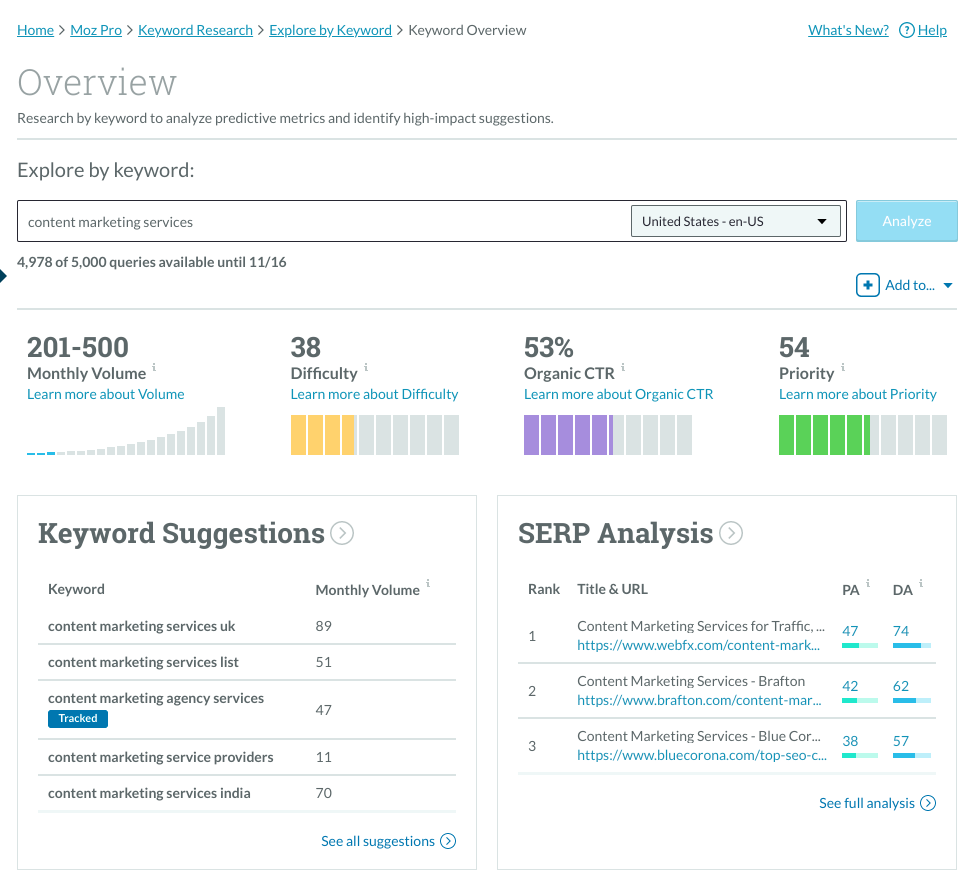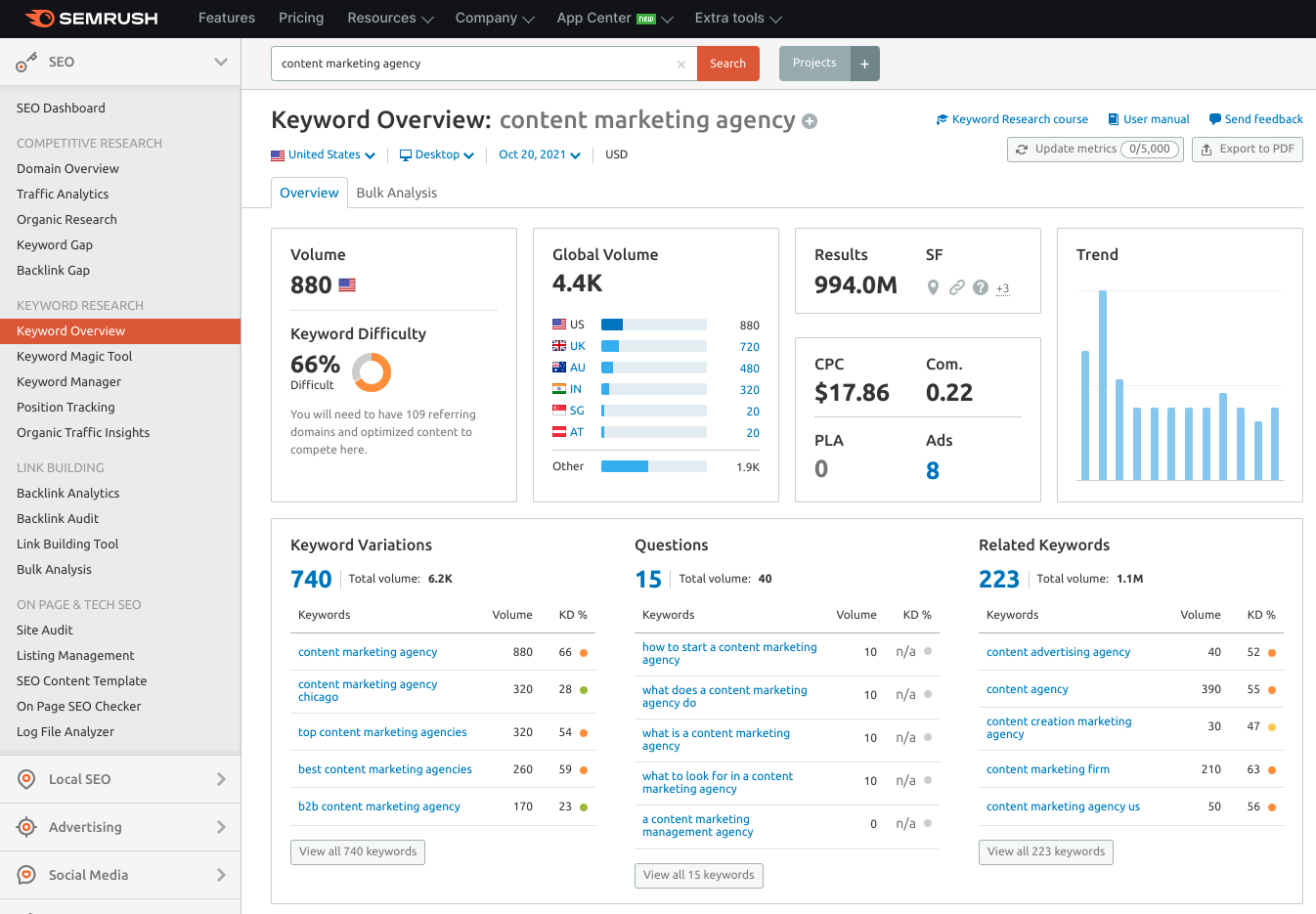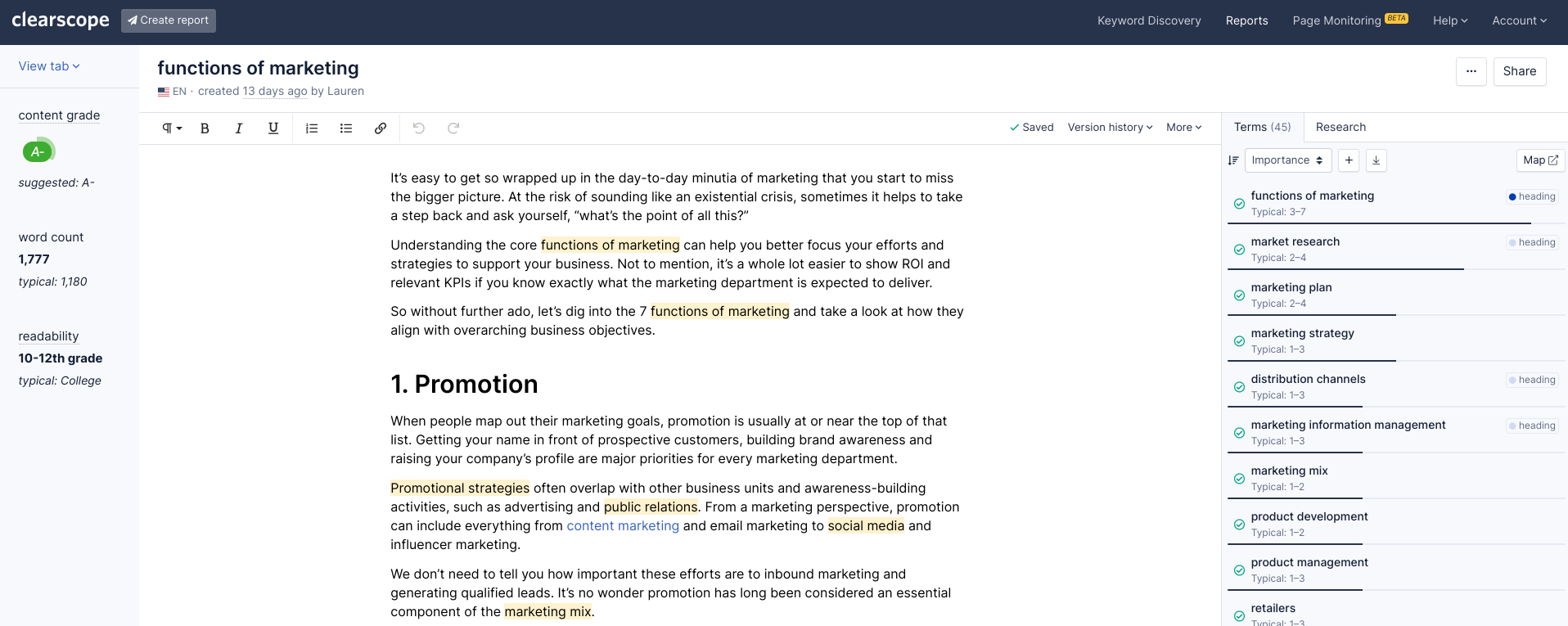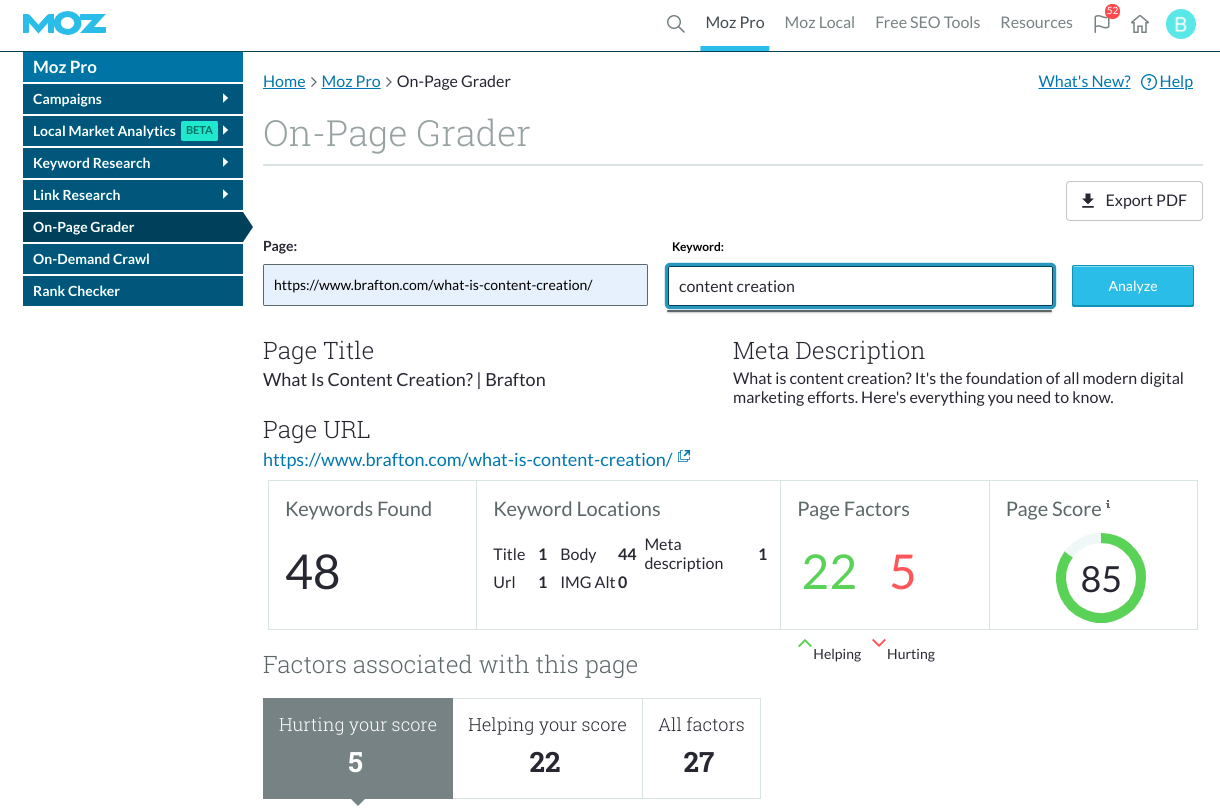In recent years, search engine optimization has become steadily more complex, spurred by evolving algorithms and fierce competition. To create search-friendly content today, guesswork and intuition aren’t enough: You need scientific analysis, powered by hard data.
The various software tools designed to provide this analysis have become a thriving cottage industry in recent years.
What is a Content Analysis Tool?
A content analysis tool is a solution that analyzes the SEO value of content. This could mean text analysis or content audit for one of your pages or a comparison with a competitor’s website. Keyword research is a common feature of these software applications, as is page ranking.
To receive an enterprise-grade SEO experience for your content, you will typically have to pay. While some solutions offer free tiers, trials or affordable user packages, you should set aside some budget for your content analysis tool of choice.
Reflecting the general trend toward cloud-based software, today’s top content analysis tools are available as Software-as-a-Service products on a subscription model. These offerings fill an essential role in your SEO toolkit.
Why is Content Analysis Important?
Content analysis is valuable because in an age of carefully crafted messaging, lack of data means flying blind. Without content analytics on the performance of your text or its relative strength compared to competitors’ offerings, it’s unclear whether the deliverables are providing a good return on investment.
From time-sensitive articles to evergreen landing pages, every page on a website today has an SEO value, for good or ill. Unless you’re measuring what that impact is, your content strategy will always be missing quantitative input. Since your competitors will likely be measuring their own content’s performance and ROI it’s hard to imagine catching up to them without a carefully planned approach, powered by data.
There is more than one place in your content strategy where a content analysis tool can prove indispensable. High-level planning becomes easier when you understand the most popular terms and trends in your industry. Your content creators’ day-to-day work is more efficient with artificial intelligence input, so you’ll get more ROI from their efforts.
Subscribe to
The Content Marketer
Get weekly insights, advice and opinions about all things digital marketing.
Thank you for subscribing to The Content Marketer!
9 Top Content Analysis Tools on the Market
No matter which individual element of page strength you’re trying to tune up, there’s at least one content analysis tool out there to help you. These offerings come from a broad spectrum of providers, and differ in price point and ease of use.
The following are 9 of the most popular and effective content analysis tools. Some are designed to grade your written content while you compose it, while others give a list of suggestions about a published page. Still others help you with keyword research or competitive analysis.
1. Google Analytics
The appeal of Google Analytics is right there in the name. Google is the No. 1 search engine, and this is Google’s tool for analyzing the success of your content. Considering how much angst can be caused by trying to figure out Google’s “secret sauce,” there is value in going right to the source.
Google Analytics exists within the Google Marketing Platform and delivers reports, analysis and intelligence about the performance of your brand’s content. To make sure it has plenty of data to work with, Analytics is natively integrated with other widely used Google tools, as well as Salesforce Marketing Cloud.
2. Moz Keyword Explorer
This content analysis tool is available in both free and paid versions, letting you try it before ramping up your usage. The solution is designed to give your recommendations about the best keywords to use, based on a primary key phrase or URL.
You can build a strategy around the results you get from the Keyword Explorer. This may involve generating a long list of keywords related to a single topic and sorting it by predicted performance across multiple metrics. The results of that sort will tell you what to prioritize.

3. BuzzSumo
The central idea behind BuzzSumo is its ability to identify which content is performing well with audiences and why. There are four kinds of analysis: discovery of popular existing content; web-crawling content research; influencer analysis and ranking; and ongoing monitoring of trends and comments.
BuzzSumo users are able to turn their view inward and see which of their own posts are most successful or focus on their industries at large. You could use the former approach to troubleshoot your latest campaign, or the latter to inspire your next piece of content.
4. Semrush
One marketing hook behind Semrush is that it combines many different content analysis tools into a single package. It enables research on future content topics optimized to rank with a target audience while also containing traffic analysis and SEO audit capabilities.
By tracking which keywords are ranking globally or locally and performing competitor research, you can create an informed content strategy. To cover all bases, there are also advertising and social media tool sets available in the Semrush suite.

5. Ahrefs
The Ahrefs SEO tool suite is based on 5 main functions: optimizing a site, analyzing competitors, researching likely keywords, collecting industry-wide data and tracking search rankings. Ahrefs foregrounds its learning materials and community support, creating a user-friendly feeling.
Users of the Ahrefs suite access a series of dashboards, each tied to one of the core functions. The simplified visual look of these tools fits in with the overall low-key feeling. To get users started, Ahrefs offers a $7 7-day trial.
6. Clearscope
By using artificial intelligence algorithms, Clearscope is able to offer relevant recommendations to writers as they’re completing their content. The solution integrates with Google Docs and WordPress, which allows writers to keep using their composing platforms of choice while still seeing Clearscope’s metrics.
Those metrics include word count, readability and content grade, which update in real-time as writers work. This allows users to change their approach on the fly while aiming for a high ranking in a specific topic or keyword family.

7. MarketMuse
MarketMuse, like Clearscope, employs AI and gives users a mark-up of the exact places in their documents that are impacting their SEO rankings. The content analysis tool was designed to be faster and more accurate than manual SEO research processes.
There are 4 MarketMuse tools based on various steps of content creation. Inventory and Audit shows current authority. Content Briefs uses AI to perform preliminary research. Optimize gives real-time content optimization recommendations and text analysis. First Drafts provides a framework to build on, created by AI algorithms.
8. Google Search Console
Google Search console is another of Google’s first-party tools, part of the same suite as Google Analytics. It differs in its exact role: While Analytics is a wide-ranging research tool, Search Console is focused on breaking down a particular business’s website.
When you use Search Console on your site, you receive several views of your page’s effectiveness. You’ll see which search terms are bringing in visitors and learn which parts of the site are harming your rankings. You can even submit pages for search “crawling” by Google and see how the search giant’s bots view your pages.
9. Moz On-Page Grader
The Moz On-Page Grader is a feature of Moz Pro which shows a list of recommended SEO fixes for a specific URL. The tool scores the page’s search discoverability and provides notes on which parts of the page are helping or hurting its ability to rank.
When you use the On-Page Grader, the list of suggested fixes comes with examples on how to address the issue in question. The checklist generated by the system is also given in priority order, so you know which issues to tackle first.

How to Implement Data into Your Content Strategy
If you’re not yet using any content analysis tools in your SEO strategy, there’s no need to panic. Integrating new technology into your content marketing is an intuitive process, especially because making these new investments doesn’t change your main goals.
Here are just a few examples:
- You’ve always been hoping to rank as highly as possible in search results for a particular term.
- Now, with the right content analysis tool, you have a clear view of the elements in each post that are helping or hindering you with that objective.
- Your leadership team is wondering why a competitor’s website is delivering better ROI than yours despite surface similarities.
- Analysis of the relevant data will determine which articles on that rival site are driving its success, which lets you create plans to outrank your competitor.
- Content writers are wasting too much time editing content for potential SEO value, measuring each new draft’s success by trial and error.
- Using an AI content analysis tool, those creators can see the relative SEO importance of topics or individual phrases while writing. By the time they press “publish,” they’ll already know what the page’s effect will be.
Crunching data with these tools is a key element of determining ROI. You’re investing in your content efforts, so what results are you getting? With one or more of these tools, you can add new dimensions to your content strategy.





